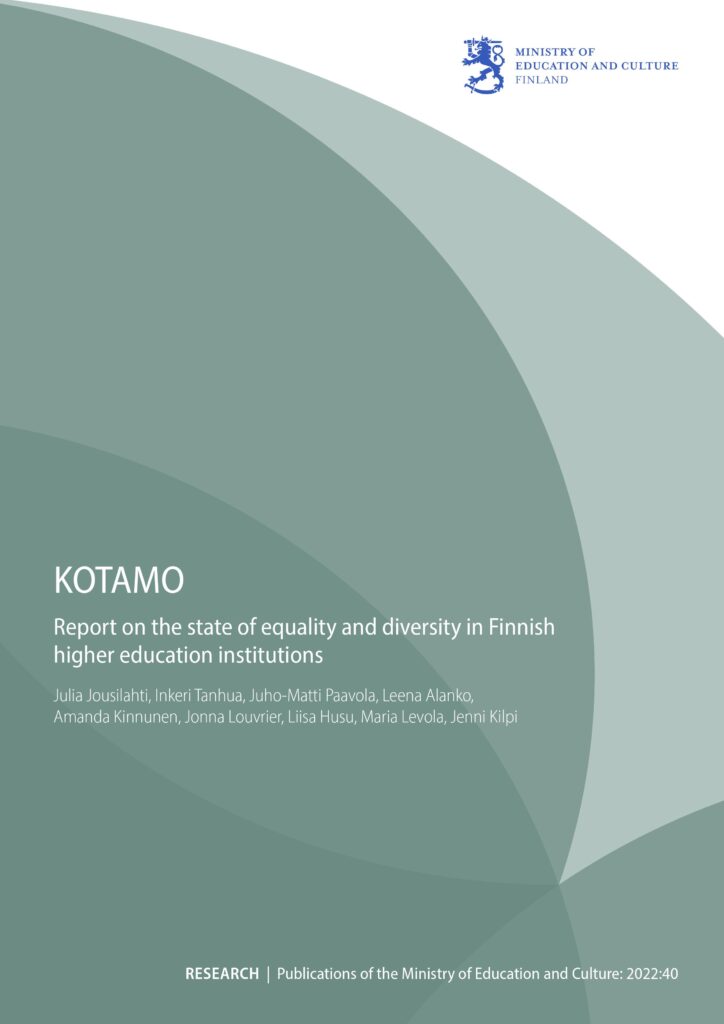Equality and diversity need to be improved in Finnish higher education institutions. This study showed that Finland lags behind its peer countries in promoting equality and diversity. There are large differences between higher education institutions in their ambition to address equality and diversity issues and, for example, in implementing and monitoring statutory equality and diversity plans.
Equality and diversity need to be improved in Finnish higher education institutions. The portion of researchers and teaching staff belonging to different ethnic minorities, for example, based on language or nationality, is particularly worrying, reveals the KOTAMO project. The project was commissioned by Finland’s Ministry of Education and Culture and led by Demos Helsinki.
The project consortium, led by Demos Helsinki’s senior expert Julia Jousilahti, investigated the state of equality, diversity and non-discrimination among teaching and research staff in Finnish higher education institutions, with a particular focus on gender and ethnicity. The study focused on career development, recruitment, everyday experiences of discrimination and the actions taken to promote equality and diversity in higher education. The study showed that Finland lags behind its peer countries in promoting equality and diversity. There are large differences between higher education institutions in their ambition to address equality and diversity issues and, for example, in implementing and monitoring statutory equality and diversity plans.
Representatives of ethnic minorities found it more difficult to advance in their careers than those of ethnic majorities. They reported that they are not as often included in networks, development of teaching or joint funding applications as ethnic Finns. Alarmingly, ethnic minority respondents were nearly twice as likely as ethnic majority respondents to report experiencing discrimination in higher education institutions.
In particular, respondents of ethnic minorities who were at the lowest career levels felt that recruitment criteria and processes were not transparent — for example, proficiency in Finnish was not required, but nevertheless, Finnish speakers seemed to be favoured in the selection process. Universities should communicate their recruitment criteria more openly. In addition, KOTAMO researchers recommend that those participating in recruitment undergo mandatory equality and non-discrimination training.
In everyday situations, even in English-speaking workplaces, people of other languages are often left out when informal conversations occur in Finnish. A set of commonly agreed daily rules would help. When it comes to research funding parties, they could actively promote inclusiveness by reporting the distribution of their funding by gender and by nationality publicly.
In total, the researchers proposed 14 different sets of measures. They were based on a survey process that included a literature review, an extensive survey, interviews and a search for inspiring foreign examples. Three workshops were organised with representatives from universities of applied sciences, universities and research funders. A scientific panel supported the workshop.
The survey was carried out by Demos Helsinki, Innolink, Oxford Research, Includia Leadership, researcher Inkeri Tanhua and Professor Liisa Husu in collaboration with Finnish higher education staff, management, funding bodies and other organisations in the field.
You can find the report here.
For more information, please contact:
Julia Jousilahti
Senior Expert
julia.jousilahti@demoshelsinki.fi


The Changing Roles of Universities: Three Ways for Doctoral Education to Respond
Post
October 4, 2019
The need for scientific knowledge, education, and critical thinking is growing − 4 theses about the role of universities in Finland in the 2020s
Publication
July 9, 2019
A new strategy for the University of the Arts Helsinki
Project
February 12, 2020
A Vision for Higher Education in 2030
Project
October 11, 2017